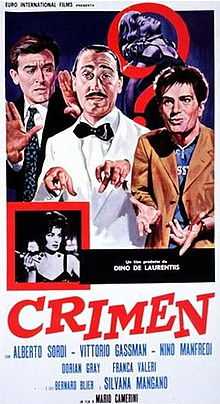Crimen (film)
| Crimen | |
|---|---|
 | |
| Directed by | Mario Camerini |
| Produced by | Dino De Laurentiis |
| Written by | Rodolfo Sonego, Luciano Vincenzoni |
| Starring |
Vittorio Gassman Nino Manfredi Alberto Sordi |
| Music by | Pino Calvi |
| Cinematography | Gianni Di Venanzo |
| Release dates | 13 December 1960 |
| Running time |
108 min 124 min (Italian cut) |
| Country | Italy |
| Language | Italian |
Crimen (also known as ...And Suddenly It's Murder! and Killing in Monte Carlo) is a 1960 Italian whodunit-comedy movie by Mario Camerini.
The movie had two remakes: the first, Io non vedo, tu non parli, lui non sente, was directed by the same Camerini in 1971 and was starred by Gastone Moschin, Enrico Montesano and Alighiero Noschese, the second, Once Upon a Crime, was filmed in 1992 by Eugene Levy and has John Candy and James Belushi in the main roles.[1]
Plot
Five people, all united by the fact of being on a train to Monte Carlo, will find themselves being involved in the murder of an elderly millionaire of Dutch origin, a regular guest of mondanissima lakeside village. The bride and groom Remo and Marina, hairdressers, are attracted by the lure of fortune in gambling, with which they intend to start their own business, the Commander Alberto Franzetti, after a failed attempt to "detoxify" the demon of the game, is back in Monaco, where his wife is waiting for him (Dorian Gray), the pair of borgatari Quirino and Giovanna is committed to bring a dog to millionaire Dutch for the lucrative reward. The six main characters, for different reasons, are involved in the investigation the murderer of the old millionaire who had lost his dog and all distrustful of the police, put in place of the clumsy attempts to prove their strangeness to the fact, finishing however, only with more compromising their position, but thanks to the research of the Commissioner of Police (Bernard Blier) will be acquitted, while the real culprits (which were ingeniously fitted alibi) will be exposed.
Cast
- Alberto Sordi: Alberto Franzetti
- Vittorio Gassman: Remo
- Nino Manfredi: Quirino
- Silvana Mangano: Marina
- Dorian Gray: Eleonora Franzetti
- Franca Valeri: Giovanna
- Georges Rivière: Eleonora's Lover
- Bernard Blier: Police Commissioner
- Sylva Koscina: Carolina
- Tino Scotti: Fiorenzo
References
External links
- Crimen at the Internet Movie Database